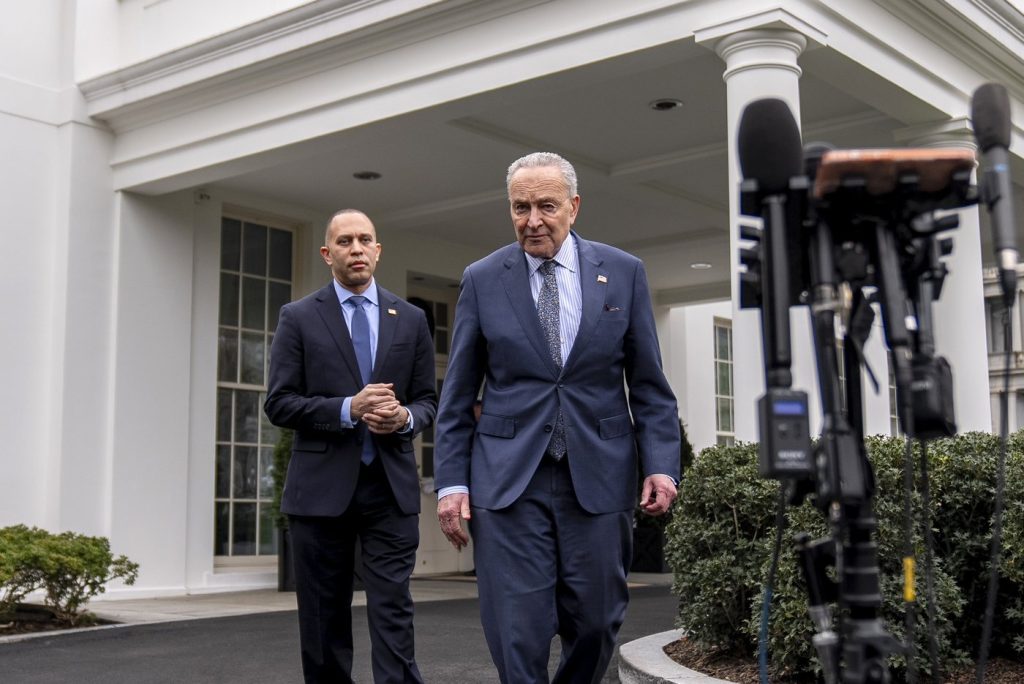WASHINGTON (AP) – Top Senate Democrat Chuck Schumer and Republican Majority Leader John Thune are facing a stalemate as the deadline approaches to keep the government operational. Despite both sides agreeing to discuss matters with President Donald Trump at the White House on Monday, there has been little indication that either party is willing to compromise.
Republicans assert that Democrats need to support a straightforward extension of government funding before the Tuesday night deadline to prevent a shutdown. They have stated they will not engage in negotiations until this extension is in place. Conversely, Democrats are advocating for immediate talks on issues such as health care, indicating their readiness to allow a government shutdown if their demands are not met.
A shutdown is "totally up to the Democrats," Thune remarked during an interview on NBC's "Meet the Press." He emphasized that the Senate possesses a bill ready for passage, which has already been approved by the House and awaits the President's signature to maintain government operations.
In response, Schumer stated that the Republicans' willingness to negotiate is contingent upon the upcoming White House meeting. He expressed concern about the implications of a government shutdown, asserting, "God forbid the Republicans shut the government down. The American people will know it’s on their back."
The current impasse in the Senate is part of a recurring struggle over funding, with expectations for a swift resolution diminishing. Some Democrats have signaled an increased willingness to permit a shutdown, especially in light of pressure from their base voters to stand firmer against Trump and the Republican-led Congress. A faction within the party believes that a shutdown may not have significant repercussions, given that Trump has already cut numerous government jobs.
Schumer noted, "We’re hearing from the American people that they need help on health care," highlighting the urgency of addressing healthcare concerns. He indicated that massive job cuts in government roles are occurring regardless, suggesting little impact from potential layoffs.
The Senate is anticipated to vote on the House-passed funding extension bill on Tuesday, just ahead of the 12:01 a.m. Wednesday deadline to avoid a shutdown. This bill would sustain government operations for an additional seven weeks while Congress completes the annual spending bills.
To successfully pass a short-term solution, Republicans will likely require support from at least eight Democrats, as Republican Senator Rand Paul of Kentucky is expected to oppose the measure. With 53 seats, Republicans need 60 votes to conclude a filibuster and get the legislation passed.
Schumer called for "a serious negotiation" in the upcoming White House meeting involving Trump and four top congressional leaders, including House Minority Leader Hakeem Jeffries and House Speaker Mike Johnson.
Last week, Trump canceled a planned meeting with Democrats, having deemed their demands as "unserious and ridiculous." Schumer described the rescheduled meeting as "a good first step," but urged that it needs to be constructive rather than unproductive disputes.
Ahead of a potential shutdown in March, several Democrats had urged Schumer to resign after he provided support for Republicans' efforts to keep the government funded.
Concerns remain among Democrats that Republicans may permit tax credits under the Affordable Care Act, which have aided many in securing affordable health insurance, to expire at the year's end. This program, informally known as Obamacare, is pivotal for low- and middle-income households, particularly as open enrollment is set to begin in November.
While some Republicans express willingness to extend these tax credits, they demand reforms to address perceived inefficiencies. Thune contended that the program is "desperately in need of reform" due to issues related to mismanagement and a lack of awareness among beneficiaries regarding their coverage.
The White House has alarmingly hinted at potential mass layoffs across federal agencies in the event of a shutdown. Trump's administration instructed departments to prepare for significant reductions in federal employment if the government faces a shutdown.
Johnson discussed the importance of leadership during these negotiations, emphasizing the need to prioritize the American people's needs. He argued that while partisan disagreements are natural, leveraging the public's services for political maneuvering is unacceptable.
Jeffries expressed a commitment to funding the government and maintaining a proactive approach to healthcare reform. He emphasized the urgent need to address rising healthcare costs, which could escalate significantly if prompt actions are not taken.
In summary, the current standoff over government funding illustrates deep partisan divides and the pressures from both sides of the aisle as lawmakers head into critical negotiations aimed at averting a government shutdown.











